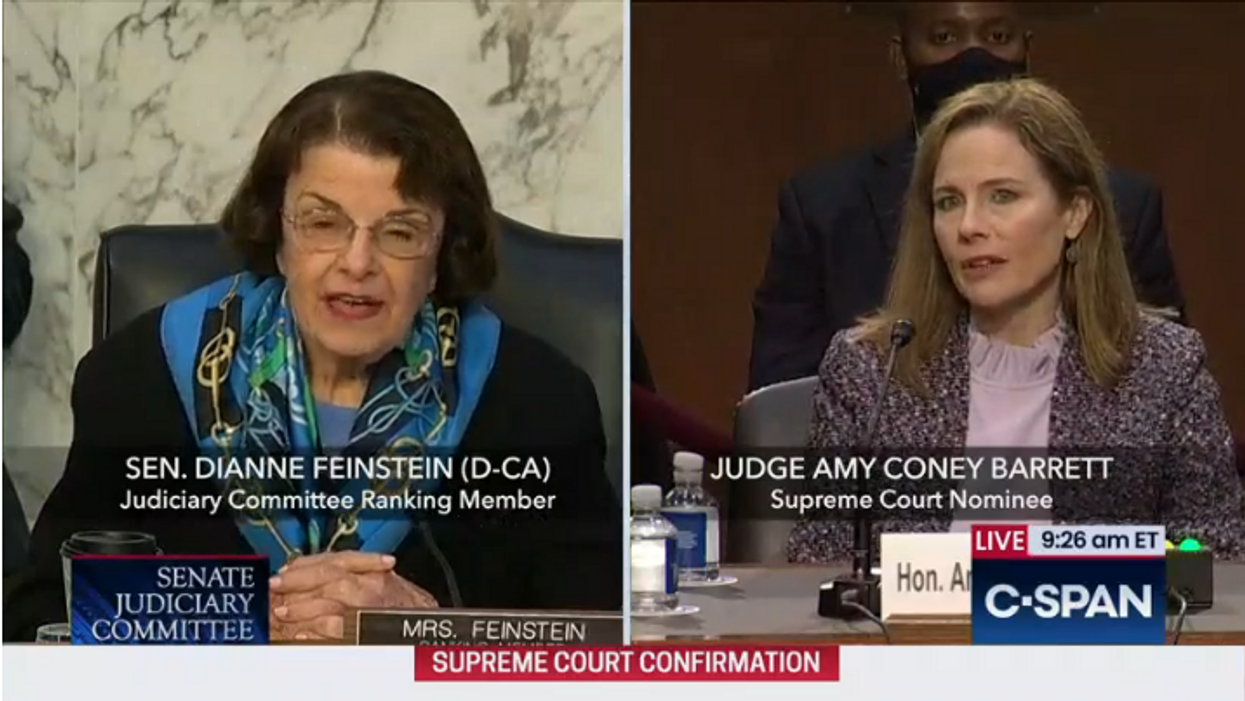Barrett Won’t Say Whether Medicare Is Constitutional
On the third day of Judge Amy Coney Barrett's Senate confirmation hearing, ranking Democrat Sen. Dianne Feinstein (CA) asked her some hard questions regarding protections for senior citizens — for which Barrett had no real answer.
"Do you agree with originalists who say that the Medicare program is unconstitutional?" Feinstein asked the Supreme Court nominee.
"Well, let's see," Barrett said, pondering a moment. "So I think I can't answer that question in the abstract."
During the course of proceedings, Feinstein also questioned Barrett about the Age Discrimination in Employment Act, which was signed into law in 1967 and prohibits employment discrimination against people 40 years of age and older.
"What do you understand to be the purpose of the Age Discrimination in Employment Act?" asked Feinstein.
Barrett responded with a reference to Kleber v. CareFusion Corp., a case that came before her on the Seventh Circuit Court of Appeals, which centered on a 58-year-old plaintiff who sued for being overlooked for a job in favor of a less-experienced 29-year-old applicant.
"In Kleber v. CareFusion, I joined a majority," Barrett answered. "... and the question is whether the prohibition on age discrimination covered applicants or only employees, and the statute said employees, and so an applicant isn't an employee, so the majority said that the statute by its terms didn't cover the conduct."
In that case, Barrett joined her peers on the court in ruling against the plaintiff, finding that the age discrimination act does not protect applicants, only employees.
If confirmed, Barrett's long-standing opposition to the Affordable Care Act could jeopardize the health of seniors if she votes to overturn it in California v. Texas, which will come before the court just after Election Day.
The high court's decision on whether to strike down the entirety of the ACA will have a far-reaching effect on seniors who rely on its protections.
And it's not hard to read the handwriting on the wall. In 2012, Barrett signed a public statement alongside other leaders referring to Obamacare's contraception coverage as an "assault on religious liberty."
Five years later, she roundly critiqued Chief Justice John Roberts, saying he used unconstitutional loopholes in order to preserve Obamacare.
Seniors would be disproportionally affected if the health care law is struck down.
Sixty million Americans depend on Medicare, the federal program for Americans over 65 and those with disabilities. If Obamacare is repealed, Medicare beneficiaries will likely see a marked increase in the cost of prescription drugs and preventive care, as well as their health insurance premiums.
A vote against Obamacare would also get rid of a 0.9 percent payroll tax increase for the wealthy, which means Medicare funding for vulnerable groups like seniors and the disabled would be lower than ever.
Senior Vice President of the Kaiser Family Foundation Tricia Neuman said a repeal would be "very disruptive" for seniors and would touch "virtually every part of Medicare."
Moreover, Obama's health care law reformed nursing homes across the nation and improved oversight and protections for residents. It's clear that nursing homes facing an influx of coronavirus during a global pandemic would suffer irreparable harm — such as limited options for long-term care, lessened protections for residents, and decreased quality of care.
Anne Montgomery, a policy adviser to the Senate Special Committee on Aging who helped write Obamacare's nursing home provisions, said if it were repealed it would send to seniors "a very unhelpful message" that "nursing-home transparency, accountability and improvement" are "not so important."
Barrett's positions endangering seniors are par for the GOP course: Donald Trump came under well-deserved fire Tuesday night when he shared a meme scorning Joe Biden and depicting him as elderly and disabled.
And Trump trails Biden among senior voters — which is why he's desperately currying favor with them by launching a last-minute multimillion-dollar ad campaign.
But nominating a Supreme Court Justice who's an existential threat to American seniors isn't going to help his cause.
Published with permission of The American Independent Foundation.












